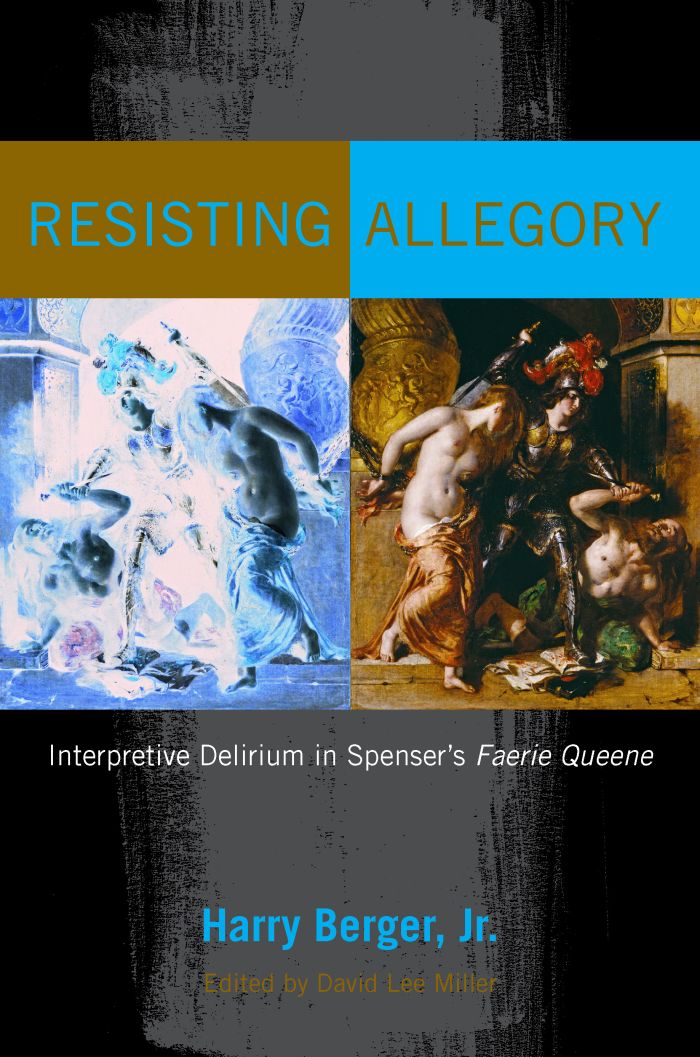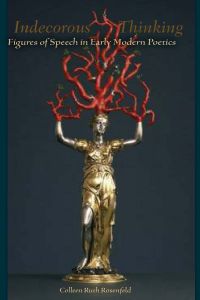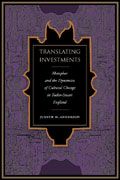Resisting Allegory
Interpretive Delirium in Spenser's Faerie Queene

This book can be opened with

Spenser is a delirious poet. He can’t plough straight. What he builds is shiftier, twistier, than anything dreamed up or put down by M. C. Escher.
So begins Resisting Allegory, in which the leading Spenser critic of our time sums up a lifelong commitment to the theory and practice of textual interpretation. Spenser’s great poem provides the occasion for a searching and comprehensive interdisciplinary exploration of reading practices¾those the author advocates as well as those he adapts or criticizes in entertaining a wide range of critical arguments with his celebrated combination of intellectual generosity and rigorous questioning.
Berger is interested in how details of the poem's language—phrases, images, figures on which we haven’t put enough interpretive pressure—disconcert traditional interpretations and big discourses that the poem has often been thought to serve. Central to this volume is an attention to the deployment of gender in conjunction with the Berger’s notion of narrative complicity.
Resisting Allegory offers a model of theoretically sophisticated criticism that never wavers in its close attention to the text. Berger offers a sustained and brilliantly articulated resistance not only to allegory, as the title indicates, but also to prevalent modes of cultural and historical criticism. As in all of Berger’s books, a lucid reflection on questions of method—based on a profound and richly theoretically informed understanding of the workings of language and of the historical situations of the people involved in it—are interwoven with an interpretive practice that serves as an exemplary pedagogical model. Berger attends to historical and political context while deeply respecting the ways in which text can never be reduced to context.
This distinctive and original book makes clear the scope and coherence of the critical vision elaborated Berger has elaborated in a lifetime of seminal and still-challenging critical arguments.
Spenser is a delirious poet. He can’t plough straight. What he builds is shiftier, twistier, than anything dreamed up or put down by M. C. Escher.
So begins Resisting Allegory, in which the leading Spenser critic of our time sums up a lifelong commitment to the theory and practice of textual interpretation. Spenser’s great poem provides the occasion for a searching and comprehensive interdisciplinary exploration of reading practices¾those the author advocates as well as those he adapts or criticizes in entertaining a wide range of critical arguments with his celebrated combination of intellectual generosity and rigorous questioning.
Berger is interested in how details of the poem's language—phrases, images, figures on which we haven’t put enough interpretive pressure—disconcert traditional interpretations and big discourses that the poem has often been thought to serve. Central to this volume is an attention to the deployment of gender in conjunction with the Berger’s notion of narrative complicity.
Resisting Allegory offers a model of theoretically sophisticated criticism that never wavers in its close attention to the text. Berger offers a sustained and brilliantly articulated resistance not only to allegory, as the title indicates, but also to prevalent modes of cultural and historical criticism. As in all of Berger’s books, a lucid reflection on questions of method—based on a profound and richly theoretically informed understanding of the workings of language and of the historical situations of the people involved in it—are interwoven with an interpretive practice that serves as an exemplary pedagogical model. Berger attends to historical and political context while deeply respecting the ways in which text can never be reduced to context.
This distinctive and original book makes clear the scope and coherence of the critical vision elaborated Berger has elaborated in a lifetime of seminal and still-challenging critical arguments.
Harry Berger, Jr., is Professor Emeritus of Literature and Art History and a Fellow of Cowell College at the University of California, Santa Barbara. A Fellow of the American Academy of Arts and Sciences, he is the author of fourteen books, most recently Harrying: Skills of Offense in Shakespeare's Henriad (Fordham, 2016).
David Lee Miller is Carolina Distinguished Professor Emeritus of English and Comparative Literature at the University of South Carolina. He is the author of Dreams of the Burning Child: Sacrifiial Sons and the Father’s Witness (Cornell, 2003) and The Poem’s Two Bodies: The Poetics of the 1590 Faerie Queene (Princeton, 1988).
[[back cover]]
“Berger’s new volume on Spenser’s narrative poem will be essential to all Renaissance scholars. Like Berger’s earlier books, Resisting Allegory develops and complicates our thinking on The Faerie Queene along a number of fronts. Berger’s notion of narrative complicity, familiar now through his famous readings of Shakespeare, is richer and more complex for its encounter with Spenser and with gender analysis.”—Theresa Krier, Macalester College
“Since his first book in 1957, Harry Berger has remained a model for each successive generation of Spenser scholars—to many of us, the leading figure of our lifetimes. Resisting Allegory, a beguiling exercise in his late style, continues the lifelong work of engaging the allegorical project of The Faerie Queene in intellectually expansive ways. Every reader and scholar of Spenser will want this book.”—Roland Greene, Stanford University
Berger’s new volume on Spenser’s narrative poem will be essential to all Renaissance scholars. Like Berger’s earlier books, Resisting Allegory develops and complicates our thinking on The Faerie Queene along a number of fronts. Berger’s notion of narrative complicity, familiar now through his famous readings of Shakespeare, is richer and more complex for its encounter with Spenser and with gender analysis.—Theresa Krier, Macalester College
Since his first book in 1957, Harry Berger has remained a model for each successive generation of Spenser scholars—to many of us, the leading figure of our lifetimes. Resisting Allegory, a beguiling exercise in his late style, continues the lifelong work of engaging the allegorical project of The Faerie Queene in intellectually expansive ways. Every reader and scholar of Spenser will want this book.—Roland Greene, Stanford University
Resisting Allegory is our latest occasion to spend time thinking and laughing along with Harry, with the critic's critic as he reads the poet's poet.—Jeff Dolven, The Spenser Review
Spenserians continue to learn from Berger’s early career close readings of Spenser’s text; we take delight in hearing Berger’s voice and watching him play in the text he has constructed subsequently.—Journal of British Studies
Harry Berger (Author)
Harry Berger, Jr., is Professor Emeritus of Literature and Art History at the University of California, Santa Cruz. His most recent books include Figures of a Changing World: Metaphor and the Emergence of Modern Culture and A Fury in the Words: Love and Embarrassment in Shakespeare’s Venice (both Fordham).
Harry Berger, Jr., is Professor Emeritus of Literature and Art History and a Fellow of Cowell College at the University of California, Santa Barbara. A Fellow of the American Academy of Arts and Sciences, he is the author of fourteen books, most recently Harrying: Skills of Offense in Shakespeare's Henriad (Fordham, 2016).
David Lee Miller (Edited By)
David Lee Miller is Carolina Distinguished Professor Emeritus of English and Comparative Literature at the University of South Carolina. He is the author of Dreams of the Burning Child: Sacrifiial Sons and the Father’s Witness (Cornell, 2003) and The Poem’s Two Bodies: The Poetics of the 1590 Faerie Queene (Princeton, 1988).
Facebook Twitter
Editor’s Introduction | vii
Introduction: On Texts and Countertexts | 1
Book One: The Legend of Holinesse
1. Displacing Autophobia in The Faerie Queene,
Book 1: Ethics, Gender, and Oppositional Reading
in the Spenserian Text | 17
Book Two: The Legend of Temperaunce
2. Narrative as Rhetoric in The Faerie Queene | 103
3. Wring Out the Old: Squeezing the Text, 1951–2001 | 143
Book Three: The Legend of Chastity
4. Resisting Translation: Britomart in Book 3 of
Spenser’s Faerie Queene | 173
5. Actaeon at the Hinder Gate: The Stag Party
in Spenser’s Gardens of Adonis | 211
Acknowledgments | 245
Notes | 247
Index | 289





